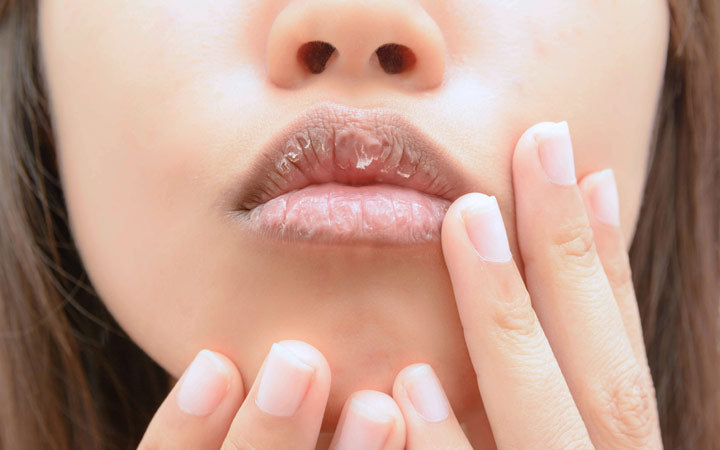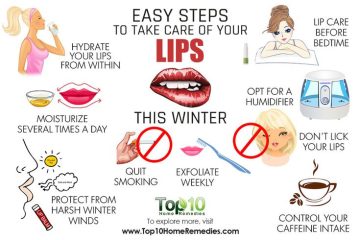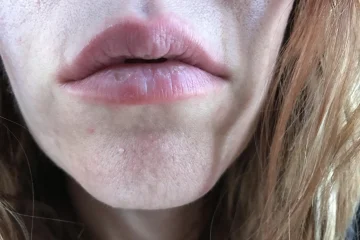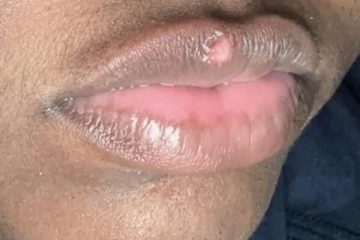Peeled lip skin typically heals within a week if properly cared for. Keeping them moisturized can speed up the recovery process.
Lips are a focal point of our facial features, playing a crucial role in speech and expression. They’re also subject to a variety of environmental factors, such as wind, sun, and dry air, which can cause them to peel. Maintaining the health of your lips is essential for both comfort and appearance.
When lips do become damaged or peel, it’s important to understand the healing process and how to promote faster recovery. Gentle care and protection from further irritants can ensure your lips return to their smooth state promptly. By addressing the issue with proper hydration and avoiding harmful habits like picking at the skin, healing time can be minimized ensuring that your lips remain soft and resilient against everyday challenges.
The Lip Skin Regeneration
Your lips endure daily challenges. From weather elements to daily conversations. Occasionally, the delicate skin peels, but fear not! Lip tissue is remarkably resilient and regenerative. Grasp how your lips heal and rejuvenate with insightful detail below.
The Resilience Of Lip Tissue
Lip tissue stands out in its healing capabilities. Composed of soft, vulnerable cellular structures, it can still repair itself efficiently. Understanding its resilience offers insight into its healing time.
Factors Impacting Healing Time
- Hydration: Well-hydrated lips heal faster.
- Nutrition: A balanced diet supports speedy recovery.
- Environmental Factors: Harsh conditions may prolong healing.
- Lip Care Routine: Regular care can minimize damage.
- Overall Health: Good health leads to quicker regeneration.
The Healing Phases Of Lip Skin
Peeling lips can be a nuisance, but healing is a natural process. Your lips go through different stages before fully healing. Understanding these stages helps manage expectations and promotes faster recovery. Let’s explore each phase in detail.
Inflammation Stage
The first reaction to peeled lip skin is inflammation. During this period, the body works to protect the area and start the healing process. Key points in this stage include:
- Redness and swelling may occur.
- Pain or a burning sensation is common.
- The body sends immune cells to fight bacteria.
- This stage usually lasts 1-3 days.
Proliferation Stage
The second phase is proliferation. In this stage, the body builds new tissue. The following are key aspects:
- The lips start to build new cells.
- Blood vessels expand to supply nutrients.
- A soft scab forms to protect the area.
- This phase can last up to a week.
Maturation And Remodeling
In the final phase, maturation and remodeling, the new skin strengthens. This phase features:
| Activity | Description | Duration |
|---|---|---|
| Collagen Production | Collagen fibers reorganize for stronger skin. | Several weeks |
| New Skin Maturation | Final healing as the new skin matures. |
Following these steps, peeled lip skin generally heals within 2-4 weeks.
Tips To Facilitate Healing
Keep lips moisturized with balm or ointment. Drink plenty of water. Avoid picking at the skin. If symptoms persist or worsen, seek medical advice.
Common Causes Of Peeled Lip Skin
Caring for your lips is crucial for a healthy smile. Sometimes, you may notice the skin on your lips starts to peel. Before seeking remedies, it’s crucial to understand why this happens. Here are some common reasons why you might experience peeled lip skin.
Environmental Factors
Diverse weather conditions take a toll on delicate lip tissue. Dry air, wind, and extreme temperatures are frequent culprits. Your lips lack natural oils, making them vulnerable to the environment around them. Consider these environmental factors:
- Low humidity – dry air can sap moisture.
- Cold winds – chapped and peeling lips often follow.
- Overexposure to sun – UV rays damage delicate skin.
Physical Damage
Lips endure a lot of physical stress. Biting, licking, and the use of certain lipsticks can lead to peeling. Your daily habits might contribute to this condition:
| Activity | Potential Impact on Lips |
|---|---|
| Chewing | Damage from teeth |
| Licking | Removes natural moisture |
| Harsh products | Chemicals that irritate |
Underlying Health Issues
Occasionally, health conditions lead to lip peeling. Allergies, nutritional deficiencies, or certain diseases can manifest through your skin. Be aware of these health-related triggers:
- Allergic reactions – to food or skincare products.
- Nutritional lack – especially vitamins B and iron.
- Chronic conditions – like eczema or psoriasis.

Credit: skinkraft.com
Average Recovery Time For Peeled Lips
Peeled lips can be uncomfortable. Healing time depends on several factors. It ranges from a few days to a week. Let’s explore the average recovery time for peeled lips with clearer insights.
Typical Healing Period
Lips are sensitive. When damaged, the skin needs time to regenerate. A typical healing period is 2 to 3 days. This quick turnaround is because lips heal faster than other skin areas.
- Avoid licking or touching the area. This slows down recovery.
- Use lip balm to help with healing. Choose one with SPF and natural ingredients.
- Stay hydrated. This promotes faster healing.
When To Expect Full Recovery
For a full recovery, expect up to seven days. This allows the lip skin to fully regenerate.
| Day | Healing Stage |
|---|---|
| 1-2 | Initial Healing |
| 3-4 | New Skin Formation |
| 5-7 | Strengthening |
Factors like hydration, lip balm, and not touching can reduce this time.
Consult a doctor if lips don’t heal in a week. This might signal an underlying issue.
Do’s And Don’ts During Healing
Chapped lips can be annoying, but they heal with proper care. Know what helps and what harms during recovery. The healing time for peeled lip skin can vary, typically ranging from a few days to a week. Follow these simple do’s and don’ts to promote swift and effective healing.
Effective Home Remedies
Nature offers remedies that soothe and repair chapped lips. These gentle solutions restore moisture and comfort:
- Honey – A natural moisturizer with antibacterial properties.
- Coconut Oil – Rich in fatty acids for deep hydration.
- Aloe Vera – Calms inflammation and accelerates healing.
- Cucumber Slices – Provides a cool, hydrating effect.
Habits To Avoid
Some behaviors can delay lip healing or cause further irritation. Steer clear of these to speed up recovery:
| Don’t Do This | Because |
|---|---|
| Licking your lips | Saliva dries out skin further. |
| Peeling or picking | It can lead to bleeding and infection. |
| Using scented products | Irritants in fragrance can worsen chapping. |
| Ignoring hydration | Water intake is crucial for healthy skin. |

Credit: www.wikihow.com
Nutrition’s Role In Lip Repair
Have you ever wondered about the secret behind quick lip repair? Good nutrition plays a crucial role. Your diet can speed up the healing process for peeled lip skin. Let’s dive into the vitamins and minerals that help mend your lips faster, and which foods could promote smooth, healthy lips.
Beneficial Vitamins And Minerals For Lip Healing
To heal chapped lips, your body needs the right nutrients. Vitamins B, C, and E are powerhouses in repairing skin. Zinc and iron also assist in new skin growth. Each one strengthens your lips’ skin cells. Here’s a list of what they do:
- Vitamin B – Enhances skin health and renewal
- Vitamin C – Helps in collagen production, maintaining lip elasticity
- Vitamin E – Protects lip skin from oxidative stress
- Zinc – Assists in skin repair and inflammation reduction
- Iron – Critical for healthy blood flow, nourishing lip tissues
Foods To Promote Lip Healing
Knowing which foods to eat can be your lip’s saviour. Consume a variety of these healing foods to fast-track your recovery:
| Food | Vitamins and Minerals | Benefit |
|---|---|---|
| Leafy Greens | B Vitamins, Iron | Skin renewal and blood oxygenation |
| Citrus Fruits | Vitamin C | Collagen production |
| Nuts and Seeds | Vitamin E, Zinc | Protection and repair |
| Lean Meats | Iron, B Vitamins | Healthy blood flow and tissue repair |
Make these foods a regular part of your diet. Your lips will thank you with a speedy comeback to being soft and supple!
When To Seek Medical Attention
Lips are delicate, and their healing can vary, but when symptoms escalate, it’s crucial to act. Not all peeled lip skin cases heal on their own. In some instances, immediate medical intervention becomes necessary. Let’s understand the signs that demand you reach out for professional help.
Signs Of Infection
Your body often tells you when something is not right. Look for these signs:
- Redness extending beyond the lip edge.
- Swelling that doesn’t subside.
- Pus or discharge indicating a bacterial presence.
- Fevers and chills, suggesting your body is fighting an infection.
Should these symptoms present, consult a healthcare provider without delay.
Persistent Peeling Concerns
Sometimes peeling lingers or worsens, this too warrants a second look. Keep track of the healing timeline, and if your lips:
-
- Stay peeled for over a week.
- Show no improvement with home care.
- Develop cracking that bleeds often.
Persistent issues can be a sign of underlying health conditions. In such cases, seek a specialist’s opinion for appropriate treatments.

Credit: www.wikihow.com
Preventing Future Lip Damage
Peeling lips are common but healing requires care and patience. To sidestep future damage, embrace preventive measures. Adequate daily care and protection enhance lip healing and ward off further issues. Let’s dive into effective strategies to keep your lips supple and damage-free.
Daily Lip Care Tips
Consistent lip care is vital for healing and preventing damage. Consider these tips:
- Hydrate often to maintain lip moisture from within.
- Use a humidifier at night, especially in dry climates.
- Avoid licking your lips as saliva dries them out quicker.
- Gentle exfoliation can remove dead cells but don’t overdo it.
Protective Products And Practices
Selecting the right products is crucial. They shield lips from environmental stressors. Here’s what to include:
- Lip balms with SPF protect against harmful UV rays.
- Moisturizing agents like shea butter or coconut oil offer deep hydration.
- Avoid matte lipsticks as they can dry out your lips.
- Wear a scarf around your mouth in cold weather.
Adopt these practices and witness improved lip health, with less peeling and faster healing.
Frequently Asked Questions On How Long Does Peeled Lip Skin Take To Heal
How Long Does Peeled Lips Take To Heal?
Peeled lips typically heal within 1-2 weeks with proper care, including hydration and lip balm application. Avoid picking at the skin to prevent delays in healing.
Does Dead Skin On Lips Go Away?
Yes, dead skin on lips can naturally shed, but regular exfoliation helps speed up the process. Moisturizing after exfoliating promotes healthy lips.
How Do You Heal A Damaged Lip?
To heal a damaged lip, gently apply a hydrating lip balm or Vaseline. Stay hydrated by drinking plenty of water. Avoid licking your lips and limit exposure to harsh weather. Use a humidifier to maintain indoor moisture. If needed, consult with a dermatologist for severe damage.
Why Won’t My Split Lip Heal?
A split lip might not heal due to persistent irritation, dehydration, or underlying health conditions like vitamin deficiencies or infections. Keep the area moisturized and avoid aggravating it further. If healing doesn’t improve, consult a healthcare professional.
Conclusion
Healing peeled lip skin typically takes between 1 to 2 weeks. Keeping the area moisturized and avoiding irritants speeds up recovery. Remember, gentle care and patience are key for rejuvenation. For ongoing issues, consulting a dermatologist is advisable. Keep your lips healthy and they’ll thank you with a smooth, supple smile.



0 Comments